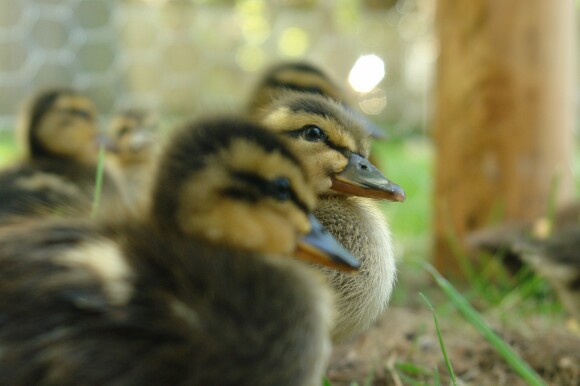
Quack! Quack! Operation Duck Rescue Is Successful
|
||||||||||||||||||
| Printer Friendly Story View |
The frantic call came in at 10:50... during the last 10 minutes of LOST.
"DAD! Mother Duck is not on the nest. I think she may have been killed. There's something out in the road and I think it's her".
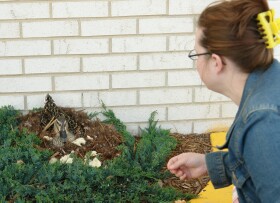
Knowing that the time was near, everyone would drive by whenever they could to check the progress. That Thursday night Emily was coming home from a ball game and made her usual check. She found the nest empty and then saw the pile of feathers in the middle of the street. That's when she made her frantic call.
Punching record on the VCR (can't miss LOST even for a duck emergency), I waited for Emily to get home then we rushed back to check it out.
There was no question as we drove past the mass of feathers. Mother Duck had left the nest and tangled with a passing vehicle. We turned into the driveway to check the nest. Lifting the mass of down and landscaping mulch we found that the clutch of 16 eggs were still very warm. Emily was insistent. We had to save the babies!
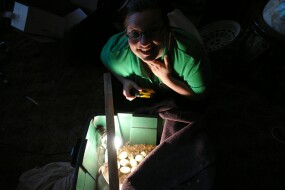
You can find anything on the net. There was a wealth of information on ducks. We learned that mallards are relatively easy to hatch. You can even purchase eggs by mail. Following instructions from an egg vendor, we improved our incubator, inspected the eggs and waited.
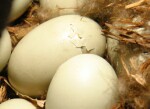
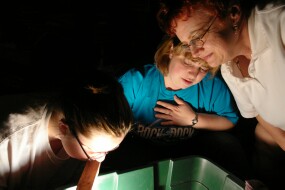 |
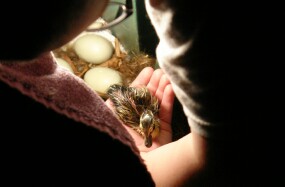 |
Shortly after "Des" led the way, other eggs started hatching quickly. Within a couple of hours there were five little ducklings and the action seemed over. We shut the door and all went to bed.
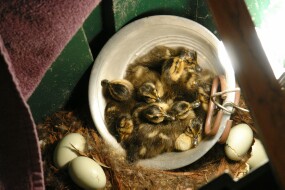
The first 13.
Ducks, chickens, quail, geese and similar birds hatch ready to go. They do not require the parents to feed them. The morning before the eggs hatched I went to the farm store and purchased a bag of "duck starter crumbles". This feed and an ample supply of water is all baby ducklings need to thrive.
And thrive these ducklings have. To our surprise, the day after the thirteen eggs hatched, two of the remaining three hatched. The last to arrive picked up the name "Jack". We used a piece of orange yarn around his neck as an identifier, although he is obviously the smallest of the brood.
Our own little flock is a week old and it's time to get them out of the spare room of the house. (Baby ducks are cute but far from clean!) Fortunately there is help right here in the person of Sandy Miner of Essexville, a member of the Tri-County Wildlife Support Team.
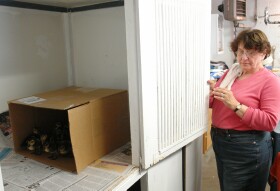
Ducklings move in with Sandy
Sandy said she was raised on a farm and it was a natural fit to work with animals and birds. She became a high school science teacher, which just reinforces her interest. She currently teaches Environmental Science at the Bay-Arenac Alternative High School.
Last year the team took in about a hundred birds. With the season just starting she already has two red tail hawks, an eagle, a great horned owl and a tiny baby screech owl, and now 15 ducklings. The garage of her Essexville home is set up with brood boxes. A smaller room contains two old hospital infant incubators. The large backyard has a small pond and a large flight training pen where birds can get outdoors and learn the basics.
As we looked around Kelley noticed a bucket with unusual contents. "Are those rats?" she asked. "Oh yes, the freezer is full of rats and mice. Those are white mice thawing in that other tub." Birds of prey are one of Sandy's specialties and a steady supply of natural food is essential. As she says "They're always hungry."
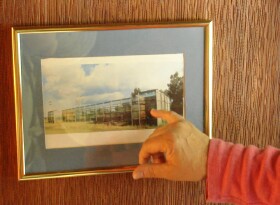
Large Bird Pens
Taking in wild birds is not for just anyone. Sandy holds state and federal permits and is certified to handle endangered species. Before we left we had to fill out paperwork to comply with the regulations. "It's not like is once was" said Sandy. "There are many rules now."
It was great to rescue this brood of ducklings. But it's important to understand that most baby animals you find should be left alone. Wild animal babies are not constantly watched by their parents. They are left alone for extended periods of time. Unless the babies are in obvious danger, or you know the parents are dead or injured, just leave the babies alone.
Sandy said "it's just sort of an expensive hobby". But talking to her it was very obvious that Sandy Miner loves wildlife and takes her work rescuing birds very seriously. Thanks Sandy! We're glad we found you!
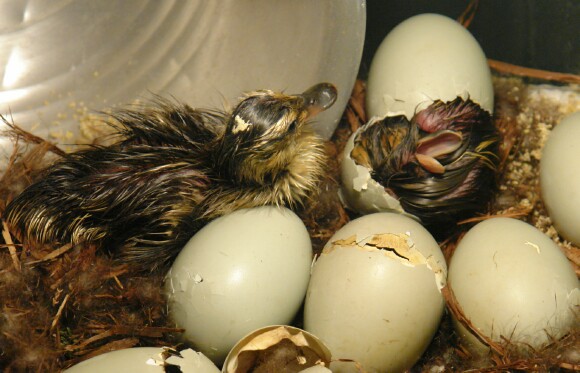 Des attends the hatching of Number Two |
|
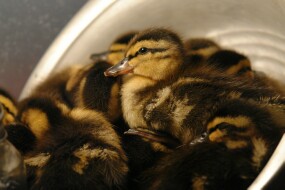 Top Duck! |
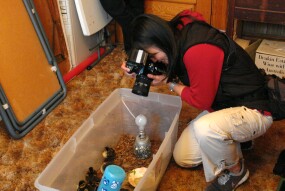 Posing for The Bay City Times |
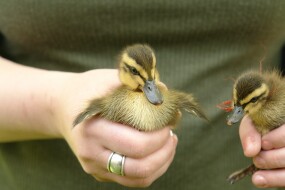 Des and Jack |
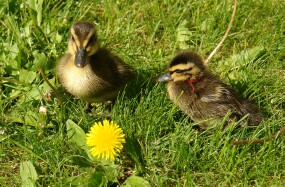 Des and Jack |
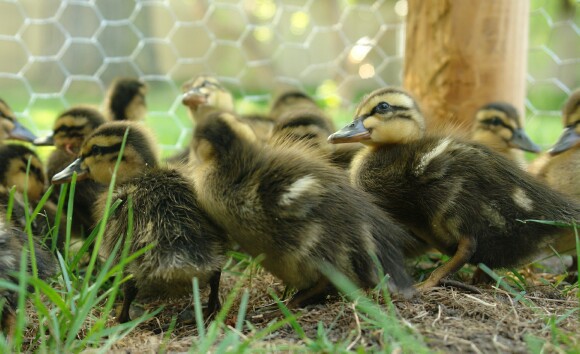
First Time Outside
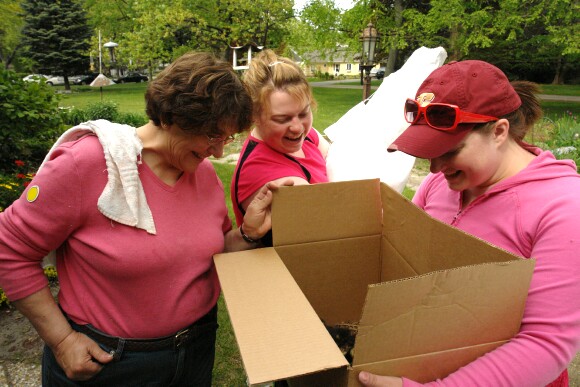
Arrival at the Tri-County Wildlife Support Team
Sandy Miner, Kelley Kent, Emily Kent
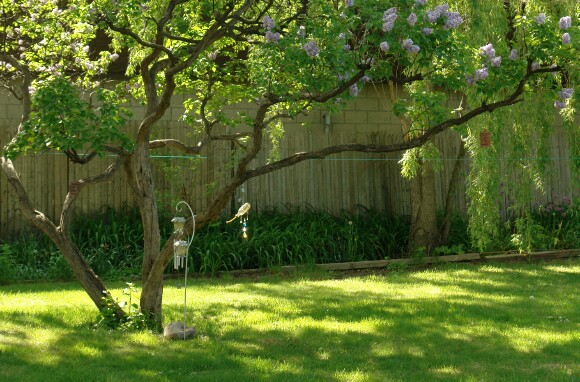
Mother Duck's final resting place under the lilac
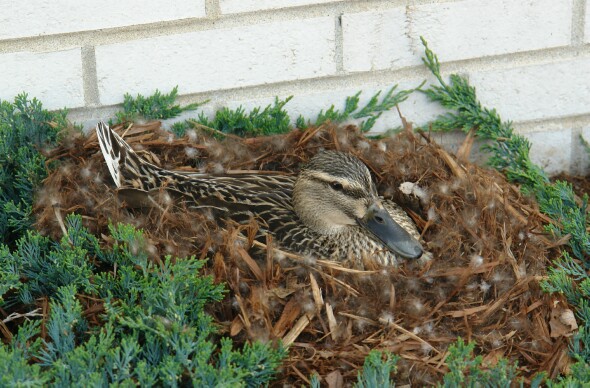
Mother Duck in her prime
| Printer Friendly Story View |
|
|

Stephen Kent |
|
|
|
Printer-Friendly Story View
0200 Nd: 04-22-2024 d 4 cpr 0
12/31/2020 P3v3-0200-Ad.cfm
SPONSORED LINKS
12/31/2020 drop ads P3v3-0200-Ad.cfm


